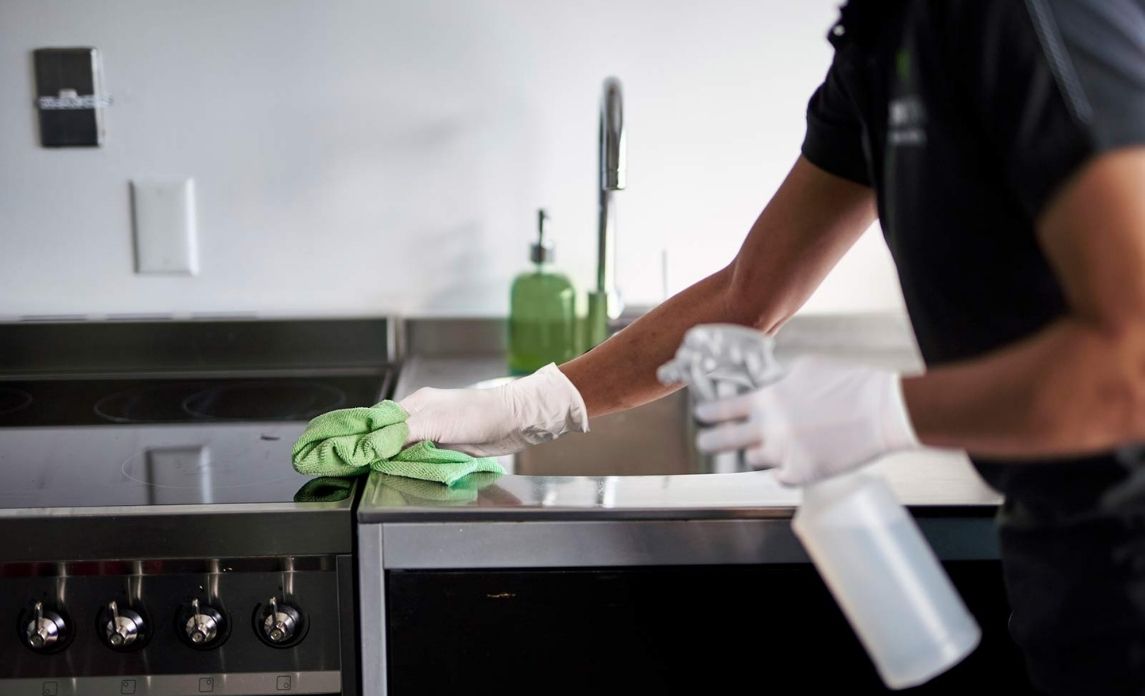A dirty office kitchen is a constant battle in most workplaces. It is incredibly frustrating when some people don’t take responsibility for their part of the office cleaning, leaving mess for everyone else to deal with. Dirty dishes, food slopped all over the benches, nasty old tuna cans – it really can get quite disgusting!
It’s important to keep the kitchen clean for a variety of reasons:
- It creates an unpleasant working environment and could impact the happiness of staff
- It is a bad impression for visitors to your business
- It could pose health and safety risks from foodborne illnesses, or injuries from slipping on wet floors
A recent Australian study found that poor office hygiene severely impacts employee morale. Three out of four employees believe that having an unhygienic workplace means their employer doesn’t care about their wellbeing.
An unpleasant office kitchen can also force employees to have to eat lunch at their desks, which is known to increase the risk of illness due to the high number of bacteria on workspace office equipment. It is therefore in the best interests of managers and staff to have a properly maintained and clean kitchen.
If you have been struggling with this issue, it might be time to try some new tactics or perhaps consider commercial cleaning. Take a look at our office kitchen cleaning tips below.
Do your bit!
The office kitchen wouldn’t get so messy if we were all pulling our weight! Be mindful of your behaviour in the shared spaces at your office and if you make a mess – clean it up! Spilt some food in the microwave? Grab a paper towel and mop it up. Used the last paper towel on the roll? Get another one from the supply closet so it’s ready for the next person. It’s simple stuff that can really make all the difference.
Have all the right supplies
You can’t expect the place to be spotless all the time if you aren’t providing the right gear. Make sure your employees have easy access to:
- Cloths and paper towels
- Surface sprays
- Dish liquid and brushes
- Rubbish bins and bin liners
- Recycling bins
- Adequately sized refrigerators and dishwashers
If you are an employee and your management hasn’t provided you with these necessities, ask your office manager or support services to get your office kitchen stocked up!
It might also be helpful to provide some small labels so staff can label their food with their name sand the date before it goes in the refrigerator.
Implement some basic guidelines
Some people just aren’t as aware as others when it comes to keeping shared spaces clean and tidy. It might be time to set up an office cleaning etiquette policy. This should include the basics like cleaning up after yourself, washing or rinsing your own dishes, and not leaving old rotten food in the fridge.
Make sure everybody knows the rules. Communicate them through your internal communications – perhaps in the regular staff newsletter or just through a group email to all staff. It is also important to include it in inductions or manuals for new staff, so everybody coming on board is aware of what they need to do.
Make some posters or signs to go around the kitchen walls to keep the policy visible and remind everyone of their responsibilities in the office kitchen.
Set up a roster
Perhaps the guidelines and friendly reminders aren’t working and you need to implement something a bit more regimented. Setting up a roster tends to only work in smaller offices where it can be more effectively enforced. You can assign kitchen cleaning duty to one person per week or per day, or have the tasks spread around a bit between a few people each week.
Having a roster for the office cleaning can have some pitfalls. People can become unhappy if they aren’t regular users of the kitchen but still have to clean it. Or perhaps someone slacks off on their cleaning week, making the next week extra disgusting for the person following them.
Delegate
Having a handful of people specifically delegated to monitoring the cleanliness of the office kitchen might be more efficient than having a roster system. If your workplace has office juniors or support staff, it might be necessary to build these cleaning duties into their daily tasks. You would not delegate it to senior employees or managers, whose high salaries are better spent doing more crucial work.
It is important to also set regular tasks for things that don’t get done so often, such as cleaning out the refrigerator or wiping down the microwave. These appliances can get overrun with old food, bacteria and mould in shared spaces. This could be delegated to your support team to take care of weekly, to keep things clean and hygienic for everyone.
It is worth noting that this isn’t a pleasant job and your support staff might not be super happy about having to do it, especially if it hasn’t previously been a part of their job description. You might have to manage some dissatisfaction, or perhaps come up with some other benefits (coffee shouts!) to balance it out.
Hire a professional service
Sometimes, it’s just better to let the professionals do it! This extra expense can be hard if you have a smaller business, but it is worth it. You are paying your staff to clean while they are tidying up the kitchen instead of doing their work. Hiring professional cleaners is a better use of that money.
Commercial cleaners can make a huge difference in an office kitchen, as they take care of all the stuff that so often gets missed. They will sanitise benches and tables, vacuum and mop floors, and empty and clean the rubbish and recycling bins. A regular cleaning service, even just once a week, can make a huge improvement in your overall office cleanliness.
Commercial cleaning is a great investment for your workplace. It ensures that your shared spaces are kept healthy and clean, and will keep your staff happy!


